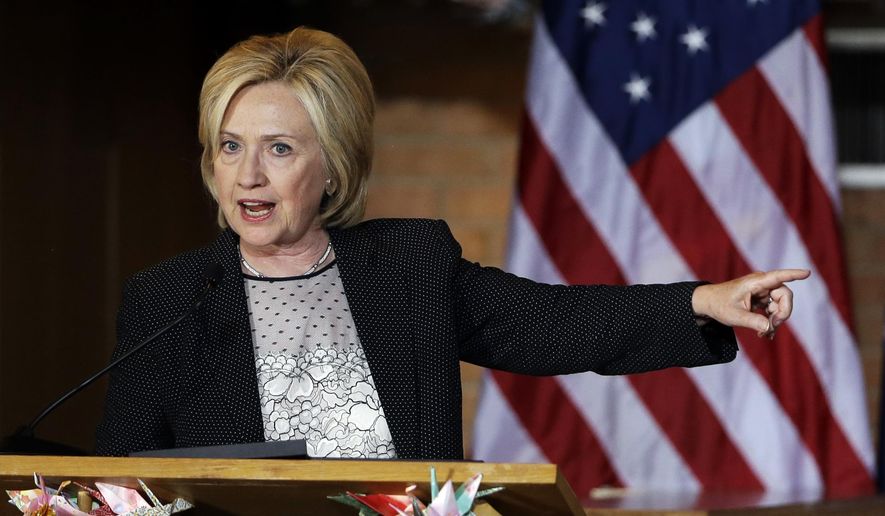Former Secretary of State Hillary Rodham Clinton didn’t turn over all of her work-related emails to the department despite her claims to have done so, the Benghazi investigative committee charged Thursday in a statement raising new questions about the Democratic presidential candidate’s email practices.
Rep. Trey Gowdy, South Carolina Republican and the Benghazi panel chairman, said the State Department informed his panel that it did not have in its possession some emails related to Benghazi and Libya that Mrs. Clinton had exchanged with longtime confidant Sidney Blumenthal, and which he turned over to the committee.
If true, it suggests that Mrs. Clinton either did not perform a full search, intentionally shielded some messages, or had some other hiccup when she claimed to have belatedly complied with federal law and turned back to the department some 30,000 messages from her time as secretary.
The Associated Press said there were 15 messages that the State Department said it couldn’t find in its own records that Mrs. Clinton provided.
“This confirms doubts about the completeness of Clinton’s self-selected public record and raises serious questions about her decision to erase her personal server — especially before it could be analyzed by an independent, neutral third-party arbiter,” Mr. Gowdy said.
Mrs. Clinton set up her own email server at one of her homes, in New York, and used an account she issued herself, rather than an account on State Department servers, to conduct business during her four years in office.
She said the arrangement was done out of convenience.
Federal law requires that officials ensure their emails, which are considered potential government records, be stored on official servers for archival purposes. Mrs. Clinton did not comply with that requirement until nearly two years after she left office, and only after the Benghazi investigative panel discovered her unique email arrangement.
At a dramatic press conference and in follow-up communications from her attorney, she said she had gone through all of her messages and decided which of the more than 60,000 from that period were personal and which were related to government business.
She said she found 30,000 that she deemed official and turned them over to the State Department in paper form. She said another 32,000 were private and she expunged them, then wiped her server clean.
A court has ordered the department to make all of the official messages public, and the department had already turned over several hundred related to Benghazi and Libya more generally, so the committee could complete its probe into the terrorist attacks of Sept. 11, 2012, which killed Ambassador J. Christopher Stevens and three other Americans.
However, Mr. Gowdy said, the emails Mr. Blumenthal exchanged with Mrs. Clinton during her time in office were business-related but weren’t part of the set that the State Department sent.
He demanded that the department say whether it had withheld the emails, or whether Mrs. Clinton never turned them over in the first place.
The messages Mr. Blumenthal produced also contradict Mrs. Clinton’s claim that his advice was “unsolicited.”
“This has implications far beyond Libya, Benghazi and our committee’s work. This conclusively shows her email arrangement with herself, which was then vetted by her own lawyers, has resulted in an incomplete public record,” Mr. Gowdy said.
The messages in question don’t go to the heart of the Benghazi attack, Democrats said.
Mrs. Clinton’s presidential campaign didn’t immediately respond to a request for comment Thursday night, nor did a spokesman for Rep. Elijah E. Cummings of Maryland, the ranking Democrat on the Benghazi committee.
A Clinton campaign spokesman told The Associated Press that they believe she fulfilled her obligations.
“She has turned over 55,000 pages of materials to the State Department, including all emails in her possession from Mr. Blumenthal,” spokesman Nick Merrill told the wire service.
They also questioned whether some of the messages Mr. Blumenthal turned over were really emails, saying they appeared to be formatted as other types of documents.
• Stephen Dinan can be reached at sdinan@washingtontimes.com.




Please read our comment policy before commenting.